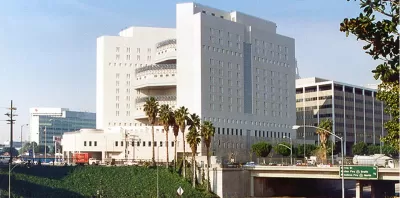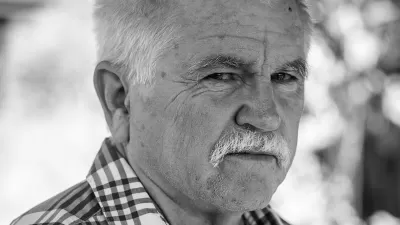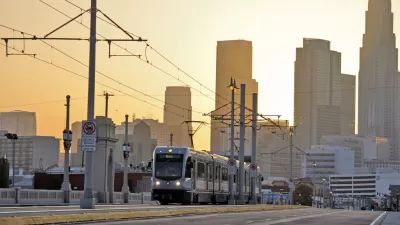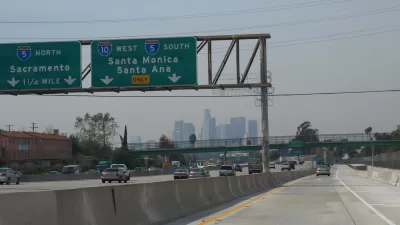The celebrated City of Quartz author speaks with the Los Angeles Times about activism, climate change, and his decision to stop cancer treatment.

Even while facing terminal cancer, iconic urban theorist and activist Mike Davis gave an expansive interview to Sam Dean of the Los Angeles Times, discussing everything from climate change to Bohemian Grove to death.
Davis is best known among urbanists for his 1990 book City of Quartz, a searing critique of corrupt Los Angeles institutions and carceral design and a prescient warning about the civil unrest that was to explode in the city just a few years later. “An astonishing run of more than a dozen books followed, oscillating between critiques and histories of the American West and sweeping historical analyses of how climate disaster, capitalism and colonialism have ground the global poor between their gears and set us up for future calamity (including global viral pandemics, predicted in 2005’s “The Monster at Our Door”).”
Dean describes Davis’ affable nature and generosity (“Our conversation lasted from midday until sunset”). Davis gives his opinion on climate change, fatalism, the LAPD, and the importance of organized social movements. For Davis, “the biggest single political problem in the United States right now has been the demoralization of tens of thousands, probably hundreds of thousands of young activists. Part of the problem is the lack of organizational structure, particularly of organizations of organizers.”
Davis concludes without wanting to leave any profound words about his own impending death. “I’m just an ordinary person going through what every ordinary person eventually goes through under circumstances that aren’t especially tragic at all.” For Davis, “ It’s been more fun just watching Golden State play or Scandinavian mysteries or reading books, above all relaxing and hanging out with the family.”
FULL STORY: Mike Davis is still a damn good storyteller

Alabama: Trump Terminates Settlements for Black Communities Harmed By Raw Sewage
Trump deemed the landmark civil rights agreement “illegal DEI and environmental justice policy.”

Planetizen Federal Action Tracker
A weekly monitor of how Trump’s orders and actions are impacting planners and planning in America.

The 120 Year Old Tiny Home Villages That Sheltered San Francisco’s Earthquake Refugees
More than a century ago, San Francisco mobilized to house thousands of residents displaced by the 1906 earthquake. Could their strategy offer a model for the present?

In Both Crashes and Crime, Public Transportation is Far Safer than Driving
Contrary to popular assumptions, public transportation has far lower crash and crime rates than automobile travel. For safer communities, improve and encourage transit travel.

Report: Zoning Reforms Should Complement Nashville’s Ambitious Transit Plan
Without reform, restrictive zoning codes will limit the impact of the city’s planned transit expansion and could exclude some of the residents who depend on transit the most.

Judge Orders Release of Frozen IRA, IIJA Funding
The decision is a victory for environmental groups who charged that freezing funds for critical infrastructure and disaster response programs caused “real and irreparable harm” to communities.
Urban Design for Planners 1: Software Tools
This six-course series explores essential urban design concepts using open source software and equips planners with the tools they need to participate fully in the urban design process.
Planning for Universal Design
Learn the tools for implementing Universal Design in planning regulations.
Clanton & Associates, Inc.
Jessamine County Fiscal Court
Institute for Housing and Urban Development Studies (IHS)
City of Grandview
Harvard GSD Executive Education
Toledo-Lucas County Plan Commissions
Salt Lake City
NYU Wagner Graduate School of Public Service





























